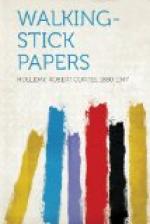“What is the price of this?” I asked. “Thri’pence?” I inquired, reading a sign.
“Three pence,” pronounced the attendant very distinctly. It was but his way of saying, “You are an American.”
I went into an office to see a man I know. “How are you?” I said in my democratic way to the very small office boy. “You are looking better than when I saw you last,” I remarked with pleasant home humour.
“I never saw you before, sir,” replied the office boy. “He is an American,” I heard him, apologising for me, tell the typist.
Some considerable while after this I went to this office again. I had quite forgotten the office boy. I handed him my card. A bright lad, he. “I’m feeling much better, sir,” he said.
In Pall Mall there is a steamship office in the window of which is displayed a miniature sheet of water. At opposite sides of this little ocean are small dabs of clay, one labelled England, the other America. Tiny ships ply back and forth between the two countries. Observers cannot make out how it is that these little boats turn about as they do, apparently of their own accord. And the scene has continually a number of spectators. (This was before the war.)
One day I was looking in at this window, very much interested in this problem. Standing next to me was a fine specimen of a Pall Mallian, with his silk “topper,” his black tail coat, his buttonhole, his checked trowsers, his large grey spats, his shining boots, his stick and his glass on its ribbon, apparently equally absorbed. I turned to him after a hit—a quite natural thing to do, I thought—and, “How the deuce do you suppose that thing works?” I said.
The tall gentleman slowly turned. Slowly, stiffly, with an aristocratic gesture, he raised his arm and placed his glass in his eye, for a moment. I was frozen by his blank stare, quite through. Then he lifted his eyebrow; the glass dropped and bounded before him on its ribbon. And he turned and walked away. Walked away, I dare say, to his frowning club, to tell how he had just been set upon in the street and insulted by some strange ruffian. But, you see, I didn’t know; I was an American.
To Epsom I went in a cart to see the Derby. It was at Epsom, you know, that the King’s horse was thrown several seasons ago by a suffragette who lost her life in the act. Well, most of the fine gentlemen of England, I think, were there, all in splendid tall grey hats and with their field glasses slung over their shoulders. And a horde of the cleverest crooks in Europe also.
There I had my pocket “cut” by a pickpocket. That is the way they go through you in England, neatly lift your pocket out. I thought this was an interesting thing, so I told it about that I had had my pocket cut, but I did not see any international significance in the affair.
The achievement, however, I discovered was much relished by my hearers in England. I, an American, had come over there and had my pocket cut. He, the crook, an Englishman very probably, had been “cuter” than I; he had “had” me, an American.




